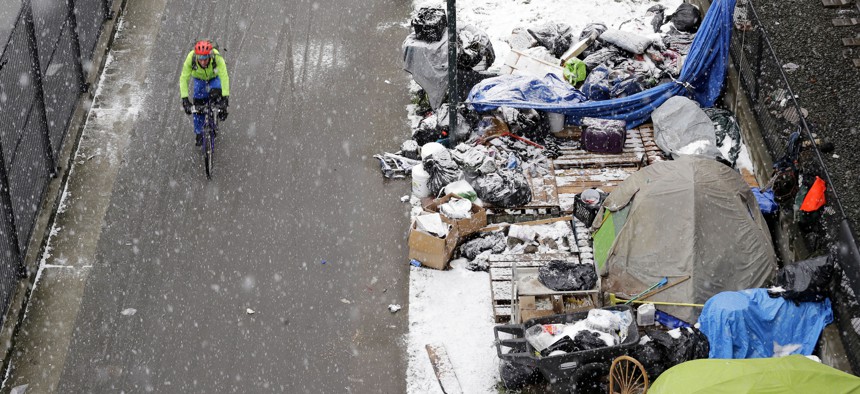A Ticket to Ride: Will Busing the Homeless Help or Just Move People Along?

A bicyclist rides past a homeless encampment as snow falls, Friday, Feb. 8, 2019, in Seattle. AP Photo/Elaine Thompson

Connecting state and local government leaders
In King County, Washington, a local lawmaker wants to spend $1 million to offer free bus tickets to homeless people to help them reunite with family.
With upwards of 11,000 homeless residents, Seattle has the third largest homeless population in the country.
The latest survey of homeless people in the region found 19% had lived in the surrounding King County for less than a year before experiencing homelessness. And 9% of respondents said reuniting with their family would help them obtain permanent housing.
Those figures peaked King County Councilmember Reagan Dunn’s interest. He’s proposed a bill that would pay for bus tickets for homeless residents to reunite with family located outside the metro region.
“If there are 11,000 homeless people and that’s 9% answering ‘yes’ they need this kind of help, that’s 1,000 people that we could help and make a marked difference in our ability to target services to the remaining homeless folks,” Dunn said.
His proposal, introduced Tuesday, would provide $1 million in funding to purchase bus tickets and conduct outreach for the program.
Last year the county spent $37,000 on reunification services, including transportation costs, Dunn said.
“That’s like spitting in the wind,” he said.
Other cities with large homeless populations have run similar busing programs for years to varying degrees of success. Critics argue that the programs at best simply move homeless people from one city to another. But others have tracked success stories, saying these initiatives can help homeless people reconnect with family and obtain stable housing.
San Francisco provided bus tickets to approximately 800 people each year through its “Homeward Bound” program. The San Francisco Chronicle analyzed data from the program this year and found that of 262 bus tickets purchased through the program from September 2018 through March 2019, 149 recipients were living with a caretaker or on their own a month after relocation. Four people were homeless again, six were back in San Francisco, another six were in jail, and one person never left the city. Others were either missing or lost contact.
“Clearly there will be cases of individuals who are bused out who continue to remain homeless or fall back into homelessness,” Dunn said. “That’s going to happen—you already have a population that are predisposed to being homeless because they’ve been homeless before.”
While the number of homeless people counted during the last homelessness survey in Seattle decreased this year, the problem continues to grow elsewhere. An annual survey of homeless individuals found the number of people without a permanent home grew from 53,000 to 59,000 in Los Angeles. Residents in both cities are dealing with the dearth of affordable housing.
The plight for homeless people in L.A. has gotten a lot of publicity, with city officials offering a series of strategies to address the large number of people living on the street in certain parts of town, from controversial restrictions on where homeless people can camp to helping move people into housing. Last year, the city said housing was found for 20,000 people, although an audit released last month criticized the outreach and services being offered. Now President Trump is wading into the issue. On Tuesday, the Washington Post reported, citing anonymous sources, that Trump is considering ways to get homeless people off the streets in southern California by moving people to government-backed facilities.
Dunn said his busing proposal in Seattle won’t be a silver bullet. But with the city and King County currently spending about $195 million a year on homeless services, he said reducing the number of people without homes in the region could help the local governments consolidate services for those who continue to need them.
Kira Zylstra, the acting director for All Home, King County’s current coordinating agency for homelessness, said community-driven programs to reunite homeless individuals with family have already had success on a smaller scale in the region. Ideally, Zylstra said she’d would like to see the county busing proposal tie into the resources and programs already being run through a grassroots network. Since December, a central fund overseen by the group has helped 399 individuals move into safe and stable housing, including a small percent who moved outside the county.
Zylstra was unsure how many people might potentially take advantage of the bus ticket program but said any approach to reuniting a homeless person with family in order to get them in a stable housing situation should be considered.
“We haven’t seen resistance to the approach. It’s really about how much capacity and community support do people have at their disposal to really lend to a stable place. It’s not always the case that folks do,” Zylstra said. “We know it isn’t an approach that will work with everyone, but we want to make sure it is something that is available to everyone.”
Andrea Noble is a staff correspondent with Route Fifty.

NEXT STORY: How to Increase Access to Gifted Programs for Low-income, Black and Latino Children




